Deadline Extended for Closing Ranch Wells
- Share via
A Los Angeles County Superior Court judge recently extended to Jan. 15 the deadline for Little Tujunga Canyon rancher Fritz Tegatz to close his water wells. The original deadline was Sept. 15.
Claiming 200-year-old water rights established by the Spanish settlers who colonized the Valley, the Valley water master ordered Tegatz in July 1996 to close the wells. A Superior Court judge upheld the water master’s order in June.
A pending lawsuit filed by the city Department of Water and Power against Tegatz also seeks payment for the water Tegatz has drawn from his wells in the past 10 years. However, Tegatz said neither the city nor the county told him he was violating the law when he built the ranch and the wells 10 years ago. He estimated that it would cost $30,000 to $40,000 annually to purchase water from the city and an additional $900,000 to install the necessary water lines.
Tegatz added that he hopes to reach a compromise with the city that would enable him to keep his 660-acre ranch open. If he has to close the wells, he said, he also would have to close a ranch facility that boards 400 horses used for trail riding. And if that happens, he said, he would have little incentive to maintain the nearby “Little T Trail”--more than a mile of pathway on the ranch used by Tegatz for trail rides and also commonly used by the public as a free access to Angeles National Forest.
Susan Trager, Tegatz’s attorney, said she also is concerned the case will set a precedent for other properties in Little Tujunga Canyon, including a juvenile detention center, a wildlife shelter and a home for autistic children, a Korean church and individual homes.
“There are people and institutions up there that aren’t going to have water if the city moves against them,” Trager said.
Assistant City Atty. Arthur Walsh said a 1979 California Supreme Court decision grants the city rights to all water above and below ground that flows into the Los Angeles river basin and the Valley.
Cited in the Supreme Court decision is a Spanish colonial law that grants cities water rights to all the water required to meet a city’s needs, said attorney Fred Fudacz, who is representing the city and the Valley water master. Fudacz added there is an ongoing investigation of water usage throughout Little Tujunga Canyon.
More to Read
Sign up for Essential California
The most important California stories and recommendations in your inbox every morning.
You may occasionally receive promotional content from the Los Angeles Times.













